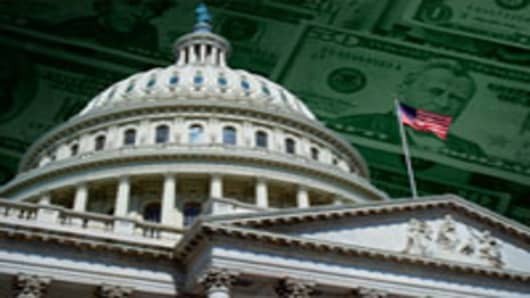America’s finances are headed for a train wreck.
By November 23, the Super Committee in Congress must come up with a package to cut the federal deficit by $1.2 trillion over ten years or draconian cuts in defense and discretionary spending follow.
Something still may be cobbled together but the federal deficit would remain too large, and could easily fly out of control. Genuine progress is not possible, because the principals won’t even accept the facts.
Democrats harp that Bush tax cuts, wars and prescription drug plan for seniors caused the deficit to swell to $1.3 trillion in 2011. Yet, with all those at play, the deficit was only $161 in 2007.
Spending is up $847 billion, and additional temporary tax cuts—such as the payroll tax holiday—account for the rest of the increased deficit. Only $62 billion was necessary to accommodate inflation, and social security, health care and other entitlements account for 78 percent of the rest.
Most economists agree GDP growth is likely to be in the range of 2 percent over the next several years, and such slow growth and high unemployment will accelerate spending on entitlements, while retarding the growth of tax revenues.
Even with somewhat more robust growth, Medicare, Medicaid and Veterans’ benefits costs will outpace the government’s ability to raise revenue, because prices in health care rise so much faster than elsewhere in the economy.
Globalization has been accelerated by US participation in the WTO and other trade agreements. This policy is founded on the belief that increased trade, while imposing adjustments, creates enough opportunities—cheaper products and new export markets—to raise living standards overall. However, if global competition is causing slower growth, high unemployment and falling wages, how can free trade foster prosperity?
The answer lies in what trade agreements leave out—manipulation of exchange rates by China and others, subsidies such as those bestowed by Europe on Airbus, and export controls such as China’s limits on rare earth minerals essential in making electronic components. Yet, many liberal Democrats and conservative Republicans—especially, influential academics and powerful campaign contributors in finance and high tech—tar as protectionist meaningful solutions to those problems.
Limits on oil and gas development double dependence on imports, and slice $250 billion annually from GDP, raise unemployment by one or two percentage points, and reduce federal revenues by $500 billion over ten years.
Failure to develop US resources does not help the environment, because it shifts the production of what petroleum Americans use from the United States, where hazards could be controlled, to developing countries, where those are mitigated less effectively.
Democrats in Congress blocking development of US energy resources refuse to acknowledge the economic costs and environmental risks those policies impose.
Finally, few politicians and analysts deny banks need better regulation, but expensive rules that retard healthy lending but don’t fix problems make little sense. Dodd-Frank reforms, pushed through by the last Democratic Congress, have not stopped risky trading on Wall Street or the big bonus culture. Yet, loans for small and medium-sized businesses and private mortgages are too scarce, because regional banks find new regulations too burdensome and deposits are increasingly concentrated among a few large banks.
Conservative Republicans are no better. Most don’t want to fundamentally fix U.S. trade policies any more than do most Democrats. They deny private markets for health services are broken, monopolized or non-existent in many places. They would give old folks the option of buying private insurance more expensive than Medicare, and poorer Americans vouchers to negotiate prices with doctors and for drugs—solutions straight from Don Quixote.
Republicans by default would let oil companies and banks do most anything they pleased. Simply, cutting government to 19 percent of GDP as they advocate would leave little money for meaningful regulation of business, and too few resources for the health care needs of old folks and the poor.
Congress may cobble a solution to stave off disastrous defense and discretionary spending cuts. However, until Congress adopts realistic trade, energy and regulatory policies to instigate more rapid growth, and better regulates health care—for example in the manner of the private German system, which accomplishes better results at 50 percent lower costs—the federal government simply won’t be able to raise taxes enough to permanently meet its responsibilities.
In the end, the federal government could print money to spend what it must. However, rising inflation would result, the interest rates investors demand on U.S. Treasuries and to make private loans will fly out of control, and the economic meltdown would ensue.
It won’t look exactly like Greece, but similar enough.
Then the Armageddon would be upon us.
Peter Morici is a professor at the Smith School of Business, University of Maryland, and former Chief Economist at the U.S. International Trade Commission.


